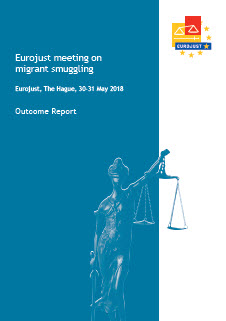Today, Eurojust, the EU Agency for Judicial Cooperation, published its third experts report on migrant smuggling, which summarises the findings of the experts meeting on migrant smuggling held at Eurojust in May of this year. Migrant smuggling is often not a stand-alone activity, but is orchestrated by sophisticated crime groups that also engage in other types of crime, such as money laundering and trafficking in human beings. Smugglers take advantage of the desperation of vulnerable populations to grow their lucrative business. Experts therefore stressed the importance of cross-border judicial cooperation, especially with States outside the European Union, to effectively detect, investigate and prosecute migrant smuggling networks.
 On 30-31 May, prosecutors and investigators from the EU Member States, third States and representatives from the European Commission, Europol, Frontex, EUNAVFOR MED, the European External Action Service and the North Sea Task Force came together at Eurojust to exchange experience and best practice in dismantling organised crime groups (OCGs) involved in migrant smuggling.
On 30-31 May, prosecutors and investigators from the EU Member States, third States and representatives from the European Commission, Europol, Frontex, EUNAVFOR MED, the European External Action Service and the North Sea Task Force came together at Eurojust to exchange experience and best practice in dismantling organised crime groups (OCGs) involved in migrant smuggling.
In the course of the meeting, the experts presented concrete case examples and highlighted developing best practice in combating migrant smuggling OCGs.
The experts emphasized that cross-border judicial cooperation, particularly with third States, is essential to detect cross-border movements of OCGs engaged in migrant smuggling. Through sharing of information, uncovering hidden cells and mapping out communications, links, and money flows are possible. Judicial cooperation also allows for the identification of links among parallel investigations in the States of origin, transit and destination and enables prosecution services to collect strong evidence that will hold up in court. Discovering links between migrant smuggling and financial investigations ensures that assets that have been illegally acquired through migrant smuggling are effectively seized and confiscated.
To further intensify the fight against migrant smuggling, the experts pointed to the possibility of capitalising on the weaknesses of migrant smuggling crime groups, e.g. the use of social media for recruitment purposes or the use of cash in their transactions. Participants also recommended making full use of all available investigative tools and judicial cooperation instruments, including joint investigation teams and Eurojust's network of contact points with third States.
Eurojust is committed to close cooperation with its partners in combatting migrant smuggling and has therefore designed a set of concrete actions to further tackle the phenomenon.
The report on migrant smuggling is also available as a Council document.
